Translations 677
Ballot Boxes in a Minefield

Ballot Boxes in a Minefield
The punitive measures that continue to be implemented in a hurry by Jeanine Áñez’s illegitimate executive, sow doubts about the path towards the announced elections in Bolivia
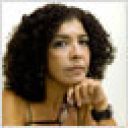 By Marina Menéndez Quintero marina@juventudrebelde.cu
By Marina Menéndez Quintero marina@juventudrebelde.cu
January 13, 2020
A CubaNews translation.
Edited by Walter Lippmann.
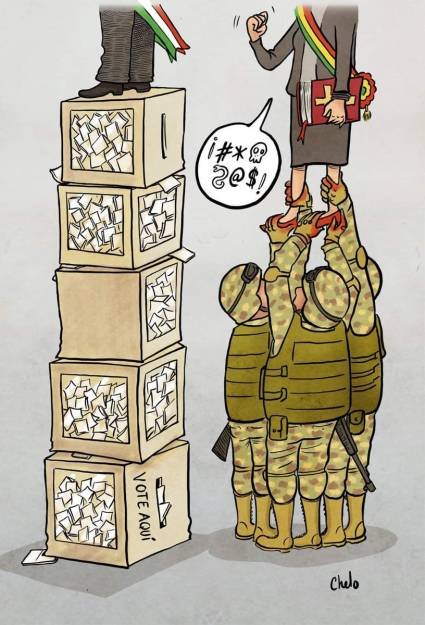 Each day that passes sows more scepticism about the cleanliness of the elections announced by Jeanine Áñez. She is the head -only the visible head, of course- of the executive under which a blow is masked that continues, while the breakup of Evo Morales’ refoundational work does not cease. And this includes society as a whole… and individuals.
Each day that passes sows more scepticism about the cleanliness of the elections announced by Jeanine Áñez. She is the head -only the visible head, of course- of the executive under which a blow is masked that continues, while the breakup of Evo Morales’ refoundational work does not cease. And this includes society as a whole… and individuals.
The harassment of the masses in the streets – which characterized the first days after the military’s “commotion” of the reelected President to leave – has been followed by selective repression that in various ways, as is the practice in the unconventional wars in now in vogue. These include imprisons, segregation, demonizing and persecuting while trampling and destroying everything that the Movement Toward Socialism (MAS) had built. The actions of the usurpers are by presidential decree, as they should be.
The signs are seen, precisely, in this devastating effort, undertaken with speed and urgency as if it were a matter of leaving no trace of the society that was built during the most recent 14 years. It’s as if it were necessary for Bolivia to enter “aseptically” in the period that will open when Áñez – as “God commands” – will hand over the position she illegally holds, since, moreover, she is supposed to be heading a transitional government.
It is only because of this desire to exterminate that we could talk about “cleaning up” in Bolivia today.
Some headlines are enough to show what is happening and to confirm, in passing, the transcendent role that “the media” continues to play in the Bolivian panorama, first bombarded, as has been denounced, by sophisticated work on social networks that includes the tens of thousands of fale Twitter accounts opened to support the coup.
Added to this are these media that, just yesterday, were spreading the work of the MAS and in 24 hours took on the lying discourse of the coup leaders. In this way, they were also showing the brutal way in which the official communication channels have been taken over and are used to manipulate.
With bayonets, and without them
There is a lot of crudeness, however, in the projection of these media, so that someone moderately aware of the truth does not read between the lines. This is how one can infer the interested sponsorship of the so-called “civil resistance” groups, a term coined in Bolivia during the uprising to attribute the positions of the coup leaders to those from below. They were pretending that they had support in the people, and which is now used to disguise the identity of paramilitary groups – that’s how Evo has called them – that replace the military and police forces in the persecution of the Morales government leaders.
In this way, one of these groups surrounded the home of the former government minister, Carlos Romero, “to avoid a possible escape,” said ABI, until the saving declaration arrived from the now appointed head of that ministry, Arturo Murillo – a man who seems to give more orders than Áñez herself – saying that Romero “has no formal accusation and absolutely nothing yet (…); then, he can circulate on the streets normally.
But not everyone has had the same “luck” as the former Romero. A woman identified only as an “employee” of former presidential minister Juan Ramon Quintana – a wanted man who has been given protection by the Mexican Embassy, which is still guarded and surrounded – was arrested on Thursday at an airport, accused of attempting the “irregular” transfer to Argentina of an unusually large sum of money.
In this way, the most atrocious persecution is orchestrated, which does not even use false charges and makes one think, at times, of the possibility of a lynching.
On the other hand, the hunt advances by means of the false criminal proceedings that once again remind us of how politics is judged in Latin America.
No less than 592! people will be investigated by the Attorney General’s office just for being in “the top” of MAS, for having occupied some “position of authority” during their terms, or even for being a relative of one of them.
The announcement was made by Alvaro Coimbra, who has been given the Justice portfolio. He said that among those being investigated are all those who have held state functions between 2006, the date of Morales’ arrival to the presidency, and last November.
It is alleged that the aim is to identify and judge those who have committed “corrupt acts of corruption”. The suspected investigation will work on a list that includes senior politicians, government officials, judicial officers, military personnel, senior executives of state-owned companies and important political party officials, according to the alternative web publication Tercera Información.
“The de facto justice minister is violating the CPE by presuming the guilt of 592 former MAS officials and their families. He puts himself above the judges by passing sentence, without a prior trial. The regime of Áñez, Mesa and Camacho is violent, a sower of false evidence and a slanderer”, Evo denounced in his Twitter account.
But there is a growing threat to him. In addition to the charges of “terrorism” and “sedition” that are falsely attributed to him, the coup leaders have now “requested” that Interpol activate an international arrest warrant for him.
Dubious environment
In such a scenario of persecution, with hundreds of MAS leaders and social activists imprisoned or threatened by corrupt judicial processes, it has been announced by the current Supreme Electoral Tribunal – renewed by the coup d’état, with a hand-picked membership and departments where it was not possible to propose candidates – that the elections will take place on May 3.
With these elections, the coup regime hopes to pass the baton and give itself a facelift. The MAS, in a daring decision, is going to the electoral tournament to recover the space that has been stolen from it, in an artful way, in Bolivian institutions.
Although the registration period for candidates closes on February 3, there are already candidates linked to the usurpation who have confirmed their candidacy, such as Carlos Mesa, Evo’s main rival and loser in the unknown elections of October. It was Mesa who set in motion the strategy of the alleged fraud since before those elections. Then there is the Santa Cruz coup-plotter and civic leader Fernando Camacho, who is already campaigning in Cochabamba, the bastion of Evo and the MAS, and the Korean-born Bolivian Chi Hyung Chu, who, like Mesa, is running again after the October elections.
The MAS has yet to reveal its candidates, which it has announced it will do in the coming days. But they are using names like former Foreign Minister David Choquehuanca, the also former head of the Economy Department Luis Arce, or the young coca growers’ leader Andrónico Rodríguez, who has just denounced the existence of “a systematic operation to behead and destroy the leadership of the Movement Toward Socialism,” and the attempt by the de facto executive to disqualify him, presenting him to the population “as the radical, as the one who seeks death and violence, and that is totally false,” he said.
Not only does the massive participation of its followers in the expanded meeting that took place in December in Cochabamba show the roots of the MAS.
An early poll released in recent days, and when the identity of the MAS candidates has not yet been revealed, gave whoever represented it the highest percentage of voting intentions (20.7 percent), above the usurper Áñez (15 percent, although she says she will not run), and Carlos Mesa (13.8 percent), among other hypothetical contenders.
However, it is doubtful that the coup d’état would allow clean and transparent elections like those he said he would demand in October: it was they who burned amphorae, committed violence, and dirtied the game to reinforce the false accusation of fraud that “justified” Evo’s deposition.
Another element, external, not only shows where the umbilical cord of that Bolivian coup is tied, but also allows one to guess what purposes that cord feeds.
Donald Trump has just announced the resumption of the so-called aid for the anti-drug struggle that Morales resigned due to the lying and interfering nature of that combat from the United States, and from its representative, the DEA.
The most eloquent thing is not that the mendacious Republican President returns to the usurpers the money that the Bolivian refoundation resigned, but the reason why he is giving it now.
According to Trump, Bolivia “is vital” to his country. And he has just discovered this after the coup leaders called for elections. It is not difficult to see what the aid is really for, and what he is looking for.
Self-Development and Resistance
- English
- Español
For the Right to Self-Development
Resistance to U.S. Imperialism
Speech at the Rosa Luxemburg Conference, Berlin, Germany
by Yoerky Sanchez, Director, Juventud Rebelde newspaper
January 11, 2020

Cuban deputy Yoerky Sanchez, member of the Council of State and director of Juventud Rebelde, Photo: Cuban Embassy in Berlin Published: 11/01/2020 | 09:31 pm
Translated and edited by Walter Lippmann for CubaNews.
Distinguished participants in the 25th Rosa Luxemburg Conference:
As a young Cuban, it is a real privilege for me to address you in this event. Since 1996 it has become a reference point for revolutionary vanguard thinking. It is a space to which Cuba gives the most precious attention. It allows us to exchange viewpoints, to join forces in the struggle against capitalism and to denounce the aggressions to which we, the peoples who have chosen the path of dignity and independence, are subjected.
Don’t the poorest, those of us who lack great resources, also have the right to our own development? Should the countries of the Third World be satisfied with being sources of raw materials and cheap labor for transnational capital? What degree of consciousness is needed to sweep away the injustices of the planet, wrapped in neoliberal packages?
Our small Caribbean island is located only 90 miles from the United States, the warrior empire that today threatens peace on Earth. From there, Cuba shows that it is possible to build “a socialist state of law and social justice, democratic, independent and sovereign, organized with everyone and for the good of all.” A socialist state that is based “on the work, dignity, humanism and ethics of its citizens for the enjoyment of freedom, equity, equality, solidarity, well-being and individual and collective prosperity.
This is expressed in the text of Article Article 1 of the new Constitution of the Republic, which was endorsed last year by 86.85% of those who went to the polls. Previously, in a broad process of consultation with the people, about nine million citizens made contributions to the constitutional proposal, which made adjustments to 60 percent of its content. This is just one example of the broad democracy we enjoy, which has emerged from our roots, which takes into account universal experience but does not copy foreign models.
The new Magna Carta guarantees the continuity of the Revolution, the irreversibility of socialism in Cuba. It projects the path towards the advancement of the communist society. Those who expected the youngest generations of Cubans to be betrayed and discouraged, or to abandon the socialist path, were once again mistaken. The people are more united than ever, with the accurate leadership of Raúl Castro, First Secretary of the Communist Party, and the leadership of President Miguel Díaz-Canel, a man born and formed by the Revolution.
This is another piece of bad news for the Trump administration. Perhaps that is why the economic, commercial and financial blockade that the United States has been imposing on our country for almost 60 years is growing at unimagined levels. The impact of this amounts to more than $138.8 billion dollars at current prices.
The blockade is overwhelmingly condemned by the international community every year. It constitutes the main obstacle to the development of our nation. No sector of Cuban life is immune to the impact of this genocidal policy.
Sometimes we find analysts who approach Cuban reality from pure theory. They attack the nature of socialism in order to present it as a decadent system. They ignore concrete objective realities, as if the losses due to the blockade had nothing to do with the difficulties of our daily life. Even so, in the midst of vicissitudes and deficiencies, Cuba exhibits a successful social model. How much more could we do for the benefit of our children, men, women and the elderly if this relentless economic war were to cease to exist?
North American officials claim that the blockade is a pretext for the Cuban government. They say that the real cause of our country’s problems lies in the political, economic and social system we have chosen. If this were so: Why don’t they repeal the blockade? Why don’t they remove the pretext? Then we would see how much more we could develop.
Trump and Pompeo’s statement that the people of Cuba are not the target of their attacks, but the government, is false and hypocritical. Their arrogance leads them to underestimate the capacity of millions of the island’s children. We are well aware of the intentions behind that discourse: to undermine national unity, and to make people believe that those who lead us are to blame for our economic problems. These are not international sanctions against the Government, as they claim. They are directly aimed at our people.
As the director of a communications medium, mainly aimed at young people, I have had the responsibility of reporting every aggressive action of the US government against Cuba, and the response of our country. In 2019, it was at the rate of one measure per week; “a turn of the screw every seven days”, as President Díaz-Canel pointed out in his recent speech to the National Assembly.
The mere chronology of those actions exceeds the time limit for my presentation in this room. But it can be consulted on the web sites of the Cuban media. I will briefly address the most notorious ones.
In May 2019, President Trump activated Title 3 of the Helms-Burton Act, which is absolutely illegal, in violation of international law, Cuban and U.S. laws. Previous presidents have not done so. Title 3 allows U.S. citizens, including Cuban Americans who were not US citizens in 1959, to file lawsuits in court against individuals or corporations with economic interests in property legally nationalized by the Cuban government.
This Act transgresses elementary rules and principles recognized in the UN Charter. These include self-determination, freedom of trade and non-interference in matters within the internal jurisdiction of States, as well as the principle of peaceful coexistence among nations.
All its sections lead to aggression and interference. For example, Title II proposes a future outline of Cuba’s political, economic and social organization once the constitutional revolutionary government is overthrown.
That is why, once the Helms-Burton Act was passed in March 1996, our Parliament responded with Act No. 80, the Cuban Dignity and Sovereignty Act. That declared the Helms-Burton Act illegal, inapplicable and without any legal force or effect in our national territory.
Also last year, the Government of [the United] States reduced the sending of remittances to persons in Cuba to only $1000.00 dollars per quarter. It banned travel on cruise ships from the United States and air flights from there to the provinces, except for Havana. It reactivated the ban on entities from third countries from selling us goods containing more than ten percent U.S. components. It reinstated the ban on U.S. intermediary banks accepting payments in dollars between Cuban banks and banks in third countries, and increased the list of entities and individuals financially blocked by the Treasury Department’s Office of Foreign Assets Control.
I will give just one example of financial persecution, which is very close. On February 14, 2019, the Treasury Department’s Office of Foreign Assets Control imposed a penalty of more than $5 million on a U.S. subsidiary, based in Germany, for 304 apparent violations of the Cuban Assets Control Regulations. This entity, which manufactures laboratory substances and chemical products for industrial use, sold its products to Cuba between May 2012 and February 2016 in violation of the blockade laws, according to OFAC.
In particular, the U.S. government conducted a fierce hunt for the oil tankers that supply our country with fuel, which put the national economy in a complex situation. Any other nation, under those circumstances, would have cut social budgets or increased the prices of hydrocarbons and electricity.
Although the impact was severe, not one school was closed in Cuba. Not one hospital was closed. We will never resort to neo-liberal formulas. The call was for savings and solidarity among us. The call was to think as a country. We showed, once again, that the Cuban people’s capacity to resist is stronger than any aggression by imperialism.
The report that Cuba presents every year at the United Nations clearly and precisely details the effects produced. The blockade is real, it exists, it is nobody’s invention but a cruel and harsh reality that seven out of ten Cubans have already experienced and suffered.
Another of the permanent points of attack, and one that has gained greater strength in recent months, is our medical collaboration. In 56 years, more than 400,000 Cuban specialists have worked in 164 countries, offering their solidarity and care to those who need it most. They do so absolutely freely and voluntarily. The World Health Organization itself has recognized this performance, particularly the island’s contribution to the fight against the Ebola epidemic in Africa.
However, to the imperial power and its media, our doctors are “slaves”. They are attacked with visceral hatred through smear campaigns, which are replicated by some lackey governments such as that of Bolsonaro in Brazil or the de facto government in Bolivia.
In Latin America and the Caribbean, we cannot forget that the oldest doctrine in the foreign policy of the United States is the Monroe Doctrine, now taken up again by the representatives of the empire. “America for the Americans”, they repeat, but they’re not just saying that.
Recent events show the reactionary right-wing’s attack on the progressive processes in our region. With unconventional warfare methods, they limit the exercise of the free self-determination of the peoples. They employ the media consortia and social networks in favor of their interests, they extend as a practice the so-called judicialization of politics or they promote the coups d’état. The cases of Lula in Brazil and Evo Morales in Bolivia are the most paradigmatic.
Imperialism and its allies on the continent take a dim view of any attempt at transformative emancipation. They cannot tolerate the existence of progressive governments in what they consider their backyard. They use their best efforts to domesticate minds through the big media. They seek to sweep away indigenous values, to make our nations identityless, and to put in their place alienating capitalist symbols. They sell the neo-liberal model as a panacea and demonize anyone who stands up to their dictates.
In the capitalist dictionary, they reserve the terms dictators and tyrants for those who mention the word socialism, or simply pretend to rule in favor of the usual oppressed. The campaign against Venezuela is part of that strategy designed in the United States.
From Cuba, we defend the Proclamation of Latin America and the Caribbean as a Zone of Peace, as ratified at the Summit of the Community of Latin American and Caribbean States in 2014, in Havana.
We advocate the right of each nation to determine its own political, economic, social and cultural system, without external interference or pressure. In this way, we reject the claims of Western powers to impose a single model of democracy, because this is not the heritage of any country or region.
Cuba does not export its democratic model, nor does it pretend to give formulas to anyone. We are aware of its improvement, of its perfectibility. We know that our own realities and those of planetary coexistence can change. What we will never change are the principles for which we have fought several generations of Cubans. What we will never change is the will to continue building socialism.
Although in my speech I have dealt with the most recent events, the conflict between the United States and Cuba has a historical character. It did not begin with the triumph of the Cuban Revolution in 1959. Its origin lies in the policy of ripe fruit, of 1823. And the attempts to buy or annex the island by the various American presidents in the 19th century. The territory illegally occupied by the Guantanamo Naval Base is also a reliable proof.
In the face of every maneuver by the empire to take over our homeland, there has always been an energetic and forceful response by the Cuban people.
In 2019, our people responded to US aggression with more resistance, work and unity. There are results. The Cuban economy did not decrease and was higher than the average in Latin America and the Caribbean. We continue to develop free and quality education and health care, sectors to which we allocate 52 percent of the State budget in 2020. The infant mortality rate was 5 per thousand live births. The number of people employed has increased and, despite the boycott on tourism, more than 4.3 million citizens have visited Cuba. More housing was built, progress was made in Internet access and computerization, and new foreign investment projects were achieved.
We arrive at 2020 with the challenge of continuing to grow and develop with our own efforts, despite the imperial siege.
Dear Conference Participants
On a day like today, 60 years ago, Commander in Chief Fidel Castro, the historic leader of the Cuban Revolution, handed over to the Ministry of Education one of the repressive centers of Batista’s dictatorship, the Fifth Police Station, to be turned into a school.
In homage to his figure, with the certainty that the new generations will continue the work he gave us, I wish to conclude my speech at the Rosa Luxemburg Conference with the words of Fidel on that January 11, 1960:
“We are calm, because if there is something they will never achieve, if there is something they will never achieve, is to confuse the people, to take away from our people the affection they feel for the Revolution, to take away from the people the faith they feel in the Revolution, to take away from the people the hope they have in a better country. If there is something they will never achieve is to take away from the people the memory of the hateful past, which will never come back”.
Many Thanks.
Thanks to Yoerky Sanchez for the text of his remarks
Juventud Rebelde’s report on the conference:
https://walterlippmann.com/cuba-at-the-rosa-luxemburg-conference/
Por el derecho a un desarrollo propio
Resistencia contra el Imperialismo estadounidense
Intervención en la Conferencia Rosa Luxemburgo, Berlín, Alemania
Por Yoerkey Sanchez Cuellar, Director, Periodico Juventud Rebelde
11 de enero de 2020

Cuban deputy Yoerky Sanchez, member of the Council of State and director of Juventud Rebelde, explained to those present the measures that the United States is unleashing against Cuba. Author: Cuban Embassy in Berlin Published: 11/01/2020 | 09:31 pm
Distinguidos participantes en la edición XXV de la Conferencia Rosa Luxemburgo:
Como joven cubano, constituye para mí un verdadero privilegio dirigirme a ustedes en este evento que desde 1996 resulta un referente para el pensamiento revolucionario de vanguardia. Es un espacio al que Cuba le otorga la más preciada atención. Nos permite intercambiar criterios, unir fuerzas en la lucha contra el capitalismo y denunciar las agresiones a las que somos sometidos los pueblos que elegimos el camino de la dignidad y la independencia.
¿Acaso los más pobres, los que carecemos de grandes recursos, no tenemos también derecho a un desarrollo propio? ¿Los países del Tercer Mundo deberán conformarse con ser fuentes de materias primas y mano de obra barata para el capital trasnacional? ¿Qué grado de conciencia se necesita para barrer con las injusticias del planeta, envueltas en paquetes neoliberales?
Nuestra pequeña isla del Caribe está ubicada a solo 90 millas de Estados Unidos, el imperio guerrerista que hoy amenaza la paz en la Tierra. Desde allí Cuba demuestra que sí es posible construir «un estado socialista de derecho y justicia social, democrático, independiente y soberano, organizado con todos y para el bien de todos». Un estado socialista que se funda «en el trabajo, la dignidad, el humanismo y la ética de sus ciudadanos para el disfrute de la libertad, la equidad, la igualdad, la solidaridad, el bienestar y la prosperidad individual y colectiva».
Así lo expresa textualmente el artículo 1 de la nueva Constitución de la República, refrendada el pasado año con el voto favorable del 86,85 % de quienes concurrieron a las urnas. Previamente, en un amplio proceso de consulta con el pueblo, alrededor de nueve millones de ciudadanos realizaron aportes a la propuesta constitucional, que hicieron variar el 60 por ciento de su contenido. Es solo un ejemplo de la amplia democracia que disfrutamos, surgida de nuestras raíces, que tiene en cuenta la experiencia universal pero no hace copia de modelos foráneos.
La nueva Carta Magna garantiza la continuidad de la Revolución, la irreversibilidad del socialismo en Cuba y proyecta el camino hacia el avance de la sociedad comunista. Quienes esperaban de las más jóvenes generaciones de cubanos y cubanas la traición y el desaliento, o que abandonáramos el camino socialista, se volvieron a equivocar. El pueblo está más unido que nunca, con la conducción certera de Raúl Castro, Primer Secretario del Partido Comunista, y el liderazgo del Presidente Miguel Díaz-Canel, un hombre nacido y formado en Revolución.
Es otra mala noticia para el gobierno de Trump. Tal vez por ello arrecia a niveles insospechados el bloqueo económico, comercial y financiero que por casi 60 años Estados Unidos impone contra nuestra patria. La afectación por esta causa suma más de 138 mil 800 millones de dólares a precios corrientes.
El bloqueo recibe cada año la condena abrumadora de la comunidad internacional. Constituye el principal obstáculo al desarrollo de nuestra nación. No hay sector de la vida del cubano ajeno al impacto de esta política genocida.
En ocasiones encontramos analistas que abordan la realidad cubana desde una asepsia teórica. Atacan la naturaleza del socialismo para presentarlo como un sistema decadente. Obvian realidades objetivas concretas, como si las pérdidas por el bloqueo no tuvieran relación alguna con las dificultades de nuestra vida cotidiana. Aún así, en medio de las vicisitudes y carencias, Cuba exhibe un modelo social exitoso. ¿Cuánto más podríamos hacer en beneficio de nuestros niños, hombres, mujeres y ancianos si esta implacable guerra económica dejara de existir?
Los funcionarios norteamericanos plantean que el bloqueo es un pretexto del gobierno cubano. Dicen que la verdadera causa de los problemas de nuestro país está en el sistema político, económico y social que hemos escogido. Si fuera así: ¿Por qué no derogan el bloqueo? ¿Por qué no quitan el pretexto? Entonces veríamos todo lo más que nos podríamos desarrollar.
Resulta falso e hipócrita el planteamiento de Trump y Pompeo acerca de que el pueblo de Cuba no es el blanco de sus ataques, sino el Gobierno. Su arrogancia los conduce a subvalorar la capacidad de millones de hijos de la Isla. Sabemos bien la intención detrás de ese discurso: socavar la unidad nacional, y hacer creer que la culpa de nuestros problemas económicos es de quienes nos dirigen. No son sanciones internacionales contra el Gobierno, como proclaman ellos. Están directamente enfiladas contra nuestro pueblo.
Como director de un medio de comunicación, dirigido fundamentalmente a los jóvenes, he tenido la responsabilidad de informar cada acción agresiva del gobierno norteamericano contra Cuba, y la respuesta de nuestro país. En 2019 fue a razón de una medida por semana; «una vuelta de tuerca cada siete días», según señaló el presidente Díaz-Canel en su discurso reciente ante la Asamblea Nacional.
La sola cronología de esas acciones rebasa el tiempo límite para mi ponencia en esta sala. Pero puede ser consultada en los sitios digitales de los medios cubanos. Abordaré, someramente, los más notorios.
En mayo de 2019 el presidente Trump activó el Título 3 de la Ley Helms-Burton, absolutamente ilegal, violatorio del Derecho Internacional, de las leyes cubanas y estadounidenses. Los presidentes anteriores no lo hicieron. El título 3 permite a los ciudadanos de Estados Unidos, incluidos los cubanoamericanos que no tenían esa ciudadanía en 1959, presentar demandas en tribunales contra personas naturales o jurídicas con intereses económicos en propiedades nacionalizadas, legalmente, por el Gobierno cubano.
Esta Ley transgrede normas y principios elementales reconocidos en la Carta de la ONU, como la libre determinación, la libertad de comercio y la no injerencia en asuntos de jurisdicción interna de los Estados, así como el principio de convivencia pacífica entre las naciones.
Todos sus postulados conducen a la agresión y la injerencia. Por ejemplo, el Título II propone un esquema futuro de la organización política, económica y social de Cuba una vez derrocado el Gobierno Revolucionario constitucional.
Fue por ello que una vez aprobada la Ley Helms-Burton en marzo de 1996, nuestro Parlamento respondió con la Ley No. 80 Ley de la Dignidad y la Soberanía Cubanas. En ese texto se declara ilícita la Ley Helms-Burton, inaplicable y sin valor ni efecto jurídico alguno en nuestro territorio nacional.
También el pasado año el Gobierno de Estados redujo el envío de remesas a personas en Cuba a solo mil dólares por trimestre. Prohibió los viajes en cruceros desde Estados Unidos y de los vuelos aéreos desde allí a las provincias, excepto La Habana. Reactivó la prohibición a entidades de terceros países de vendernos bienes que contengan más del diez por ciento de componentes estadounidenses. Retomó la prohibición de que bancos intermediarios estadounidenses acepten los pagos en dólares entre bancos cubanos y bancos de terceros países, y aumentó la lista de entidades y personas bloqueadas financieramente por la Oficina de Control de Activos Extranjeros del Departamento del Tesoro.
De la persecución financiera señalo solo un ejemplo, muy cercano. El 14 de febrero de 2019, la Oficina de Control de Activos Extranjeros del Departamento del Tesoro impuso una sanción de más de 5 millones de dólares a una empresa subsidiaria estadounidense, con sede en Alemania, por 304 aparentes violaciones de las Regulaciones para el Control de Activos Cubanos. Esta entidad, que fabrica sustancias de laboratorio y productos químicos para uso industrial, vendió sus productos a Cuba entre mayo de 2012 y febrero de 2016 en violación de las leyes del bloqueo, de acuerdo a lo indicado por la OFAC.
De manera particular, el Gobierno de Estados Unidos realizó una feroz cacería de los buques petroleros que suministran combustible al país, lo que puso a la economía nacional en una coyuntura compleja. Cualquier otra nación, en esas circunstancias, hubiera recortado presupuestos sociales o aumentado los precios de los hidrocarburos y la electricidad.
Aunque el impacto fue duro, en Cuba no se cerró una escuela; no se clausuró un hospital. Jamás acudiremos a fórmulas neoliberales. El llamado fue al ahorro y a la solidaridad entre nosotros. El llamado fue a pensar como país. Demostramos, una vez más, que la capacidad de resistencia del pueblo cubano es más fuerte que cualquier agresión del imperialismo.
En el informe que Cuba presenta cada año en Naciones Unidas se detallan de modo claro y preciso las afectaciones producidas. El bloqueo es real, existe, no es un invento de nadie sino una cruel y dura realidad que ya hemos vivido y sufrido siete de cada diez cubanos.
Otro de los puntos de ataque permanente y que en los últimos meses ha cobrado mayor fuerza, es nuestra colaboración médica. En 56 años más de 400 mil especialistas cubanos han laborado en 164 países, brindando su solidaridad y atención a quienes más lo necesitan. Lo hacen absolutamente de manera libre y voluntaria. La propia Organización Mundial de la Salud ha reconocido este desempeño, particularmente la contribución de la isla en la lucha contra la epidemia del ébola en África.
Sin embargo, para el poder imperial y sus medios de comunicación nuestros médicos son «esclavos». Arremeten contra ellos con odio visceral a través de campañas de descrédito, que replican algunos gobiernos lacayos como el de Bolsonaro en Brasil o el gobierno de facto en Bolivia.
En América Latina y el Caribe, no podemos olvidar que la doctrina más antigua en la política exterior de Estados Unidos es la Doctrina Monroe, retomada nuevamente por los representantes del imperio. «América para los americanos», repiten, mas no se queda solo en el discurso
Hechos recientes demuestran la arremetida de la derecha reaccionaria contra los procesos progresistas en nuestra región. Con métodos de guerra no convencional, limitan el ejercicio de la libre autodeterminación de los pueblos, emplean a los consorcios mediáticos y las redes sociales a favor de sus intereses, extienden como práctica la llamada judicialización de la política o promueven el golpe de Estado. El caso de Lula, en Brasil, y de Evo Morales, en Bolivia, resultan los más paradigmáticos.
El imperialismo y sus aliados en el continente ven con malos ojos cualquier intento de emancipación transformadora. No soportan que existan gobiernos progresistas en lo que consideran su traspatio. Se emplean a fondo para domesticar las mentes a través de los grandes medios. Buscan barrer los valores autóctonos, dejar huérfanas de identidad a nuestras naciones, y en su lugar, colocar los símbolos capitalistas enajenantes. Venden el modelo neoliberal como una panacea y demonizan a todo aquel que se enfrente a sus dictados.
En el diccionario capitalista reservan los términos de dictadores y tiranos para aquellos que mencionen la palabra socialismo, o simplemente, pretendan gobernar a favor de los oprimidos de siempre. La campaña contra Venezuela forma parte de esa estrategia diseñada desde Estados Unidos.
Desde Cuba defendemos la Proclama de América Latina y el Caribe como Zona de Paz, tal como fue ratificado en la Cumbre de la Comunidad de Estados Latinoamericanos y Caribeños en 2014, en la Habana.
Propugnamos el derecho de cada nación a determinar su propio sistema político, económico, social y cultural, sin injerencias ni presiones externas. De esa manera, rechazamos las pretensiones de potencias occidentales de imponer un modelo único de democracia, porque esta no es patrimonio de un país o región alguna.
Cuba no exporta su modelo democrático ni pretende darle fórmulas a nadie. Somos conscientes de su mejoramiento, de su perfectibilidad. Sabemos que las realidades propias y de convivencia planetaria pueden cambiar. Lo que no cambiaremos jamás son los principios por los que hemos luchado varias generaciones de cubanos. Lo que jamás cambiaremos es la voluntad de seguir construyendo el socialismo.
Aunque en mi intervención he abordado los hechos más recientes, el conflicto entre Estados Unidos y Cuba tiene un carácter histórico. No comenzó con el triunfo de la Revolución Cubana, en 1959. Su origen está en la política de la fruta madura, de 1823, y en los intentos de compra o anexión de la isla por parte de los distintos presidentes norteamericanos en el siglo XIX. El territorio ilegalmente ocupado por la Base Naval de Guantánamo también es una prueba fehaciente.
Ante cada maniobra del imperio por apoderarse de nuestra patria, ha existido siempre una respuesta enérgica y contundente del pueblo cubano.
En 2019, frente a la agresión de Estados Unidos nuestro pueblo respondió con más resistencia, trabajo y unidad. Ahí están los resultados. La economía cubana no decreció y fue superior a la media de América Latina y el Caribe. Continuamos desarrollando una educación y salud gratuitas y de calidad, sectores a los que destinamos en este 2020 el 52 por ciento del presupuesto del Estado. La tasa de mortalidad infantil fue de 5 por cada mil nacidos vivos. Creció la ocupación laboral y, a pesar del boicot al turismo, visitaron Cuba más de 4 millones 300 mil ciudadanos. Se construyeron más viviendas, se avanzó en el acceso a internet y la informatización y se lograron nuevos proyectos de inversión extranjera.
Llegamos al 2020 con el desafío de continuar creciendo y desarrollándonos con nuestros propios esfuerzos, a pesar del cerco imperial.
Estimados participantes en esta Conferencia:
Un día como hoy, hace 60 años, el Comandante en Jefe Fidel Castro, líder histórico de la Revolución Cubana, entregaba al Ministerio de Educación uno de los centros represivos de la dictadura de Batista, la Quinta Estación de Policía, para convertirla en escuela.
En homenaje a su figura, con la certeza de que las nuevas generaciones continuaremos la obra que él nos entregó, deseo concluir mi intervención en la Conferencia Rosa Luxemburgo con las palabras de Fidel aquel 11 de enero de 1960:
«Estamos tranquilos, porque si algo no lograrán jamás, si algo no lograrán jamás será confundir al pueblo, arrancar de nuestro pueblo el cariño que siente por la Revolución, arrancar del pueblo la fe que siente en la Revolución, arrancar del pueblo la esperanza que tiene en una patria mejor. ¡Si algo no conseguirán jamás es arrancar del pueblo el recuerdo del pasado odioso, que no volverá jamás».
Muchas Gracias
Gracias a Yoerky Sánchez por el texto de sus palabras.
Informe del peridico Juventud Rebelde sobre la conferencia Rosa Luxemburgo
http://www.juventudrebelde.cu/internacionales/2020-01-11/cuba-en-el-evento-rosa-luxemburgo-es-posible-construir-un-estado-socialista-de-derecho-y-justicia-social
Letting It All Hang Out

Letting It All Hang Out
Dialogue, discussion and the search for solutions to cracks in the work of the UJC characterized the 11th Evaluation Assembly. of the organization in the Pinar del Río municipality of Viñales
By Zorileidys Pimentel Miranda
December 22, 2019
Translated and edited by Walter Lippmann for CubaNews.
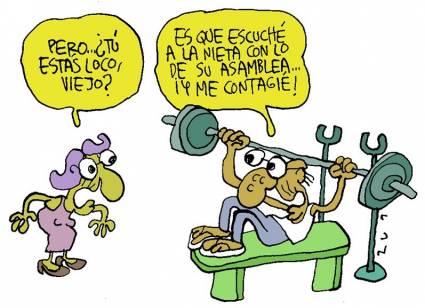
SHE: Are you crazy, old man? HE: I heard the grandchild at your assembly and I caught the urge!
Viñales, Pinar del Río – To transform, propose new ideas and enrich the work of the Young Communist League (YCL); to build spaces for self-criticism and deep discussion; to bring joy and responsibility to the tasks… The proposals are diverse, but they all seek a common goal: to make the YCL an organization with which the new generations feel committed and in which they see their interests well represented.
These times require the dynamism, creativity, and enthusiasm of the youth. Today the YCL also advocates strengthening of political and ideological preparation, knowledge of history, defense of the country and work in social networks to confront the subversive campaigns of imperialism against the Cuban Revolution.
This is what the delegates from Viñales to the 11th Evaluation Assembly. Congress, a space in which the people of Pinar del Río talked “with their shirts off”, about the main difficulties that threaten the adequate functioning of the organization in this territory.
“Enough of incorporating young people to fill the numbers. We have to focus on growing with those who really feel committed to this militancy, to the Revolution and to the tasks it assigns us,” said the secretary of the base committee of the Dos Hermanas camp, who works as a recreation technician.
He was right when he said: “Hence the importance of creating meeting spaces that allow interaction, getting to know each other and sharing our experiences. In this sense, Diosvany Acosta Abrahante, a member of the National Bureau of the UJC, urged the generation of proposals that would bring about a real change of mentality in the youth universe.
We need to guarantee greater incorporation to the ranks of the UJC. This is one of our work priorities; but it is not a question of doing it to fulfill a form, but to find creative solutions among all of us and to act as the vanguard that is the organization of the new generations, he pointed out.
“Another of the central aspects, I would say, is that we must demonstrate in each space that the youth are not lost, and that we are interested in the problems of the country. We are concerned about actively participating in voluntary work, camping, special mornings and all the activities that the UJC calls for,” said Daimarys Arteaga a pre-university student.
“Those of us who are self-employed, for example, have to be more prepared, to know about our past, the current situation of the country… because on many occasions we interact with tourists who ask us about how people live in Cuba, and that is when we have to present them with arguments to defend our truth,” said Lisandra Arencibia Llanes, who has been working in the non-state sector for four years.
In each of the views presented in the evaluation assembly, it was evident, as Acosta Abrahante said, that these are times to implement, multiply and socialize with the entire youth universe, and above all to understand that the base committee is an essential part of the effort to strengthen the internal life, structures and work of the UJC.
AMLO Offers 4000 Jobs to Migrant Caravan

López Obrador Offers 4000 Jobs to New Migrant Caravan
Migrants, seeking to reach US soil to seek asylum, are now in Guatemala.
by Juventud Rebelde digital@juventudrebelde.cu
January 17, 2020
A CubaNews translation.
Edited by Walter Lippmann.
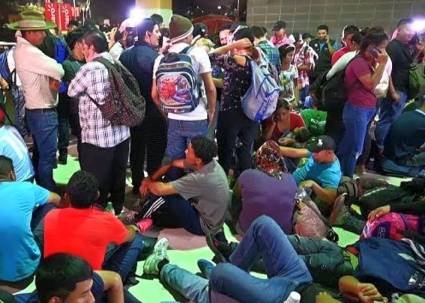 MEXICO CITY, January 17.- Mexican President Andres Manuel Lopez Obrador reported Friday the availability of 4,000 jobs in the southern border of the country for the migrants who are part of the caravan that left Wednesday from Honduras toward the United States.
MEXICO CITY, January 17.- Mexican President Andres Manuel Lopez Obrador reported Friday the availability of 4,000 jobs in the southern border of the country for the migrants who are part of the caravan that left Wednesday from Honduras toward the United States.
About 2500 to 3000 migrants come in the caravan from Honduras, and El Salvador, López Obrador said during his daily news conference, in which he announced the existence of 4000 jobs available on the southern border, he said.
The migrants, who are trying to reach U.S. soil to seek asylum, are now in Guatemala. The new president of that country, Alejandro Giammattei, said that the Mexican Executive, through its foreign minister Marcelo Ebrard, assured him that it [Mexico] would prevent the entry of the new caravan.
The Mexican government has warned us that it will not let them pass, that it will use everything in its power to stop them,” Giammattei told local media, according to RT.
Nearly 1,000 people gathered in the Great Metropolitan Central, in San Pedro Sula, in northern Honduras, to start the new caravan that aims to reach the U.S. in its flight from violence, poverty and lack of employment in that Central American country.
In September 2019, President Donald Trump reached an agreement with his Honduran counterpart, Juan Orlando Hernandez, to supposedly improve asylum capacity by containing the flow of migrants from other Central American countries.
In addition, the U.S. signed a similar agreement with Jimmy Morales, former president of Guatemala, for them to become a safe third country and for Salvadoran and Honduran migrants to seek asylum in that Central American nation, not in the U.S.
On the other hand, he pressured the López Obrador government to stop migration from Central America, in exchange for not imposing tariffs on Mexican products that are exported to the United States.
Clandestinos?
Clandestinos?
By Bárbara Vasallo
January 11, 2020
Translated and edited by Walter Lippmann for CubaNews.

Dali’s masks were used in the world against capitalism
It’s like we’re watching a low-budget fiction movie. On a profile on Facebook, that social network that many people agree is a great site, where some people are even shouting vulgarities, there are photos and videos of some masked people, using no less than one of Salvador Dali’s masks. Dalí, a Spanish painter, sculptor and writer was born in the Catalan city of Figueres on 11 May 11,1904 and died on 23 January 1989.
The use of these masks spread throughout the world precisely in anti-capitalist movements. It was used by Julian Assange, founder of WikiLeaks, in protest against capitalist police harassment for his revelations. It was also covered by the hacker movement Anonymous since 2008, and it gained even more popularity in the series The Paper House, broadcast by Netflix (actually produced by the Spanish Antena 3), something that has nothing to do with Cuba, of course.
It demonstrates the lack of culture of the characters who call themselves Clandestinos.
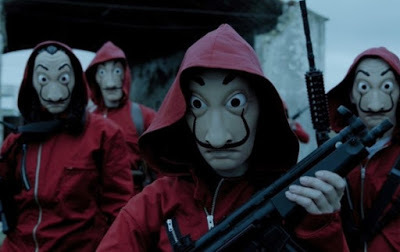
Popular in the series The Paper House
For a finishing touch, they hide behind the image of the actors Luis Alberto García and Isabel Santos, central fitures of the film of the same name by Fernando Pérez. Clandestinos was a true story of love and resistance, which reflected the lives of young people who risked their lives, really, to defend a just cause, as was the struggle on the Island in the 1950s against the dictatorship of Fulgencio Batista.
Another clear example is that these characters do not know history, either…
They missed the shot from the first act of vandalism, because they chose none other than the figure of José Martí, the National Hero of Cuba, the Apostle of Independence, the Teacher, the founder of the newspaper Patria and of the Cuban Revolutionary Party, the man who always came to the unity of Cubans against colonialism, the one who early warned against imperialism so that “it would not fall with its forces on our lands of America.”
They missed the boad because Martí is the most universal of all Cubans, and in the world, his work is known, his work is respected, so there is no morality, no culture, no decency, there’s not one iota of ethics in those who attack the figure of the Teacher, even if it is a bust of plaster, plastic, bronze or a paper fence.
Martí’s thought transcends Cubans, and his imprint is as valid as it is right now everywhere we talk about him.
Clandestinos? And the authorities have already announced that they have been caught, and from outside, where the threads of infamy are woven, and more is paid to commit these atrocities, to confuse them they say it is a lie, that they do not know if those who are in prison and confessed; And from the outside, the scandal is created by those people who approve of the obsolete policy of the US government against the island. They’re the same ones who launch campaigns so that they can’t send remittances to the families, those who applaud the President’s latest stunt that he now gave by canceling the charter flights so that Cubans could not come to their country to meet their relatives.
They were wrong to use Dali’s masks, which are known throughout the world as a symbol in the fight against capitalism, even in the series of the Netflix thieves, which is already preparing its third season. They were wrong to use the symbol of Fernando Perez’s film, and they were wrong again because they do not even have the name of the clandestine, they were quickly arrested and justice will have to act to judge such infamy.

It was used by Julian Assange, founder of WikiLeaks
For Cubans, the clandestinos of history are those young people who fell fighting in the streets of Santiago de Cuba to see their homeland free from Batista’s tyranny, the brothers Josué and Frank País who put their bodies on the front lines before the claws of the tyrants, clandClandestinos were the Saiz brothers, who turned the province of Pinar del Río upside down, the men and women who infiltrated the counter-revolutionary gangs, what do you think! organized and financed by one of the most powerful intelligence agencies in the world, tried to subvert the order in Cuba to request “support” from a foreign government.
Clandestine were those of the Wasp Network [The Cuban Five] at the end of the 20th century, who also put their lives in danger to alert Cuba to those terrorist acts, organized by the terrorists, who, paid by the same intelligence agency, wanted to spread panic in tourist facilities, and those who are still around today, because there are some, sacrificing their families, to defend the work that cost the lives of more than 20,000 Cubans.
Don’t give me that story about the mask or the little name, whatever the big plot of land that some people have turned the social network into, they are not so secret, nor so beautiful, according to nearby sources they talk up to their elbows, so clandestine, about what?

Clandestine from what?
The Woman of the Revolutionary Dream

One hundred years after the death of Rosa Luxemburg, a key figure in the history of the 20th century
The Woman of the Revolutionary Dream
On January 15, 1919, Rosa Luxemburg, one of the great figures of Marxism and a pioneer in the struggle for women’s rights, was murdered. She played a central role in the debates of the time between reform and revolution, nationalism and the class struggle.
By Sergio Wischñevsky
January 15, 2019
Translated and edited by Walter Lippmann for CubaNews.

Rosa Luxemburg’s memorial in Berlin, covered with flowers on the centenary of her death.
The figure of Rosa Luxemburg has many meanings. Her name alone implies a range of flags which, despite the fact that a hundred years have passed since her murder on 15 January 1919, are still in force. Flags that have not reached victory and yet were not lowered. In the pantheon of the great revolutionary figures of the early 20th century, she always had her space, by right and by her own weight, long before the great feminist wave,. Hers was a precursor of the struggle for women’s rights, but transcending that role of which she is largely a pioneer, were the times when still many multitudes could imagine a future without capitalism, could give their lives to such impersonal and collective causes as the revolutionary dream.
Born in Poland in 1871, she loved her homeland dominated by the Russian Empire, but she did not join the Polish nationalist movements because from a very young age she was convinced that the only freedom possible for her people was socialism. This idea crossed her mind completely. Her small figure contrasted with her dynamic energy. A socialist leader who knew her gave a remarkable description of her: “Rosa was small, with a large head and typically Jewish features, with a big nose, a difficult walk, sometimes irregular due to a slight limp. The first impression one got was not very favorable, but it was enough to spend a moment with her to see what life and what energy there was in that woman, what great intelligence she possessed, what her intellectual level was”.
After her arrest, she understood that she had to go to Germany, where the largest Socialist Party in the world was located, and she soon became an exceptional reference and polemicist.
The historical moment he lived through was crossed by two ideas, two conceptions of social organization in dispute. Those who believed that “the fatherland”, nationality, was above any other collective instance, and those who saw the class struggle as the engine of history, class identity above nationalities. In no other country was this contradiction put to the test as it was in Germany in 1914. Rosa Luxemburg, together with her comrade Karl Liebknecht, As a militant minority, they defended their opposition to the Social Democracy’s approval of the war credits that brought Germany into the First World War.
Socialism was voting for German workers to face death with French workers. The absurdity of that war vote was a tragedy that had Rosa as a great protagonist. Her opposition was not simply based on “pacifism”. She was not a peace activist, as has been repeated many times. That was simply not the war that the workers had to fight. It was an imperialist war according to their way of seeing it, which benefited the large economic corporations. Rosa wanted other wars, carrying other flags. Marx and Engels had written in the Communist Manifesto: “Proletarians of the world, unite.
These political positions earned her the right to spend the entire First World War in prison. But she wasted no time there, writing and plotting. She had great debates with the German leaders and even argued strongly with Lenin and Trotsky, even though she passionately supported the 1917 Russian Revolution.
Those who describe her say that among all her virtues she was not a great organizer. Perhaps because she did not believe in the Bolshevik conception of the vanguard party. She made detailed studies of the economy and wrote The Accumulation of Capital. She was against the German social democracy’s idda that they couyld come to power through elections and to build socialism by means of escalating reforms she wrote Reform or Revolution? But her understanding of that revolution was based on the idea of the inevitability of mass insurrection and prolonged strikes. She did not like Russian Bolshevik centralism and fought for greater democracy within socialism. These are very epochal polemics, debates of a very critical historical moment.
But the end of the war was catastrophic for Germany. The crisis that opened up brought together in the streets workers who paralyzed industry with soldiers returning from the war front extremely disappointed and with weapons in their hands. That year, 1919, was insurrectionary and Rosa was released believing that the Revolution was within reach.
Kaiser Wilhelm II, who had ruled Germany since 1888, took refuge in Holland. The same day Rosa was liberated, the Social Democrat Philipp Scheidemann proclaimed the German Republic from a balcony of the Reichstag. Then began what was called the Weimar Republic, and Friederich Ebert took over the presidency, formed a moderate Social Democratic Council of Ministers and called on the people to leave the streets and return to normalcy. The majority wing of the SPD wanted the republic and freedoms, while the Spartacists, the faction founded by Luxemburg and Liebknecht, wanted a proletarian revolution.
For the first time, a government was formed and run by socialists, but the revolt and popular unrest were not quieted. At the same time, that the Spartacists believed they saw this chaos as the cradle of the revolution, Adolf Hitler was honing his first weapons as a political leader, accusing the revolutionaries of being the ones to blame for the German defeat, the internal enemies, the high treason of the fatherland, the stabbing in the back.
Rosa knew that she was in grave danger, she had received multiple warnings and threats, but she decided not to flee from Berlin when it became clear that there was not going to be any revolution after a very bloody repression. At the Eden Hotel, Private Runge smashed her skull and face with a rifle butt. Another soldier shot her in the back of the head. Her body was tied to sacks of stones to make it heavier so it wouldn’t float, and then thrown into one of the Spree River canals near the Cornelius Bridge. Her body was not found until two weeks later. Only a few hours earlier, Karl Liebknecht, the only parliamentarian who had voted against German participation in the Great War in 1914, was killed. The police investigation claimed that Rosa was killed by a mob.
A woman, a Pole, a Jew, a Marxist, anti-war, and a revolutionary, she raised flags that today still fly in every corner of the planet, and so she remains charmingly dangerous.
Tina Modotti, 20th Century Photographer

Tina Modotti was one of the most important photographers of the 20th century
By Hortensia Hernández
Friday, January 5, 2018
Translated and edited by Walter Lippmann for CubaNews
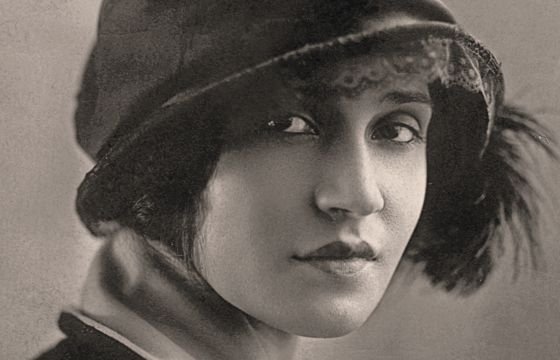
Considered one of the most important photographers of the 20th century, Tina Modotti (Udine, Italy; August 17, 1896 – Mexico City, Mexico January 5, 1942) was a communist militant and worked for the party in Mexico, the Soviet Union, Spain, Germany and Italy. Self-taught, she spoke four languages and learned the photograph trade from the famous photographer Edward Weston.
She was a woman with a short but intense life who surely went much further than she could have imagined when she was going through a childhood full of hardships, in Udine, northern Italy. She had to work from the age of 12 as a textile factory worker to help her mother provide for herself and her siblings while waiting to raise money to catch up with her father and older sister, who had migrated to the United States city of Los Angeles
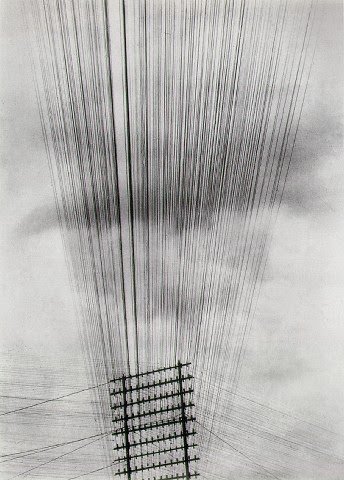
In North America, Modotti worked as a dressmaker and, in her spare time, performed within an amateur theater group. She got some roles in Hollywood silent films, an activity that could not last after the arrival of the sound cinema, which would reveal her bad English and strong Italian accent.
When she was very young, she married a poet and painter, but she soon became a widow. This brought her closer to the artistic world and it was there that she met the photographer Edward Weston. With him she first worked as a model and then as an assistant, learning how to handle the camera and the developing process and taking her first steps as a photographer.
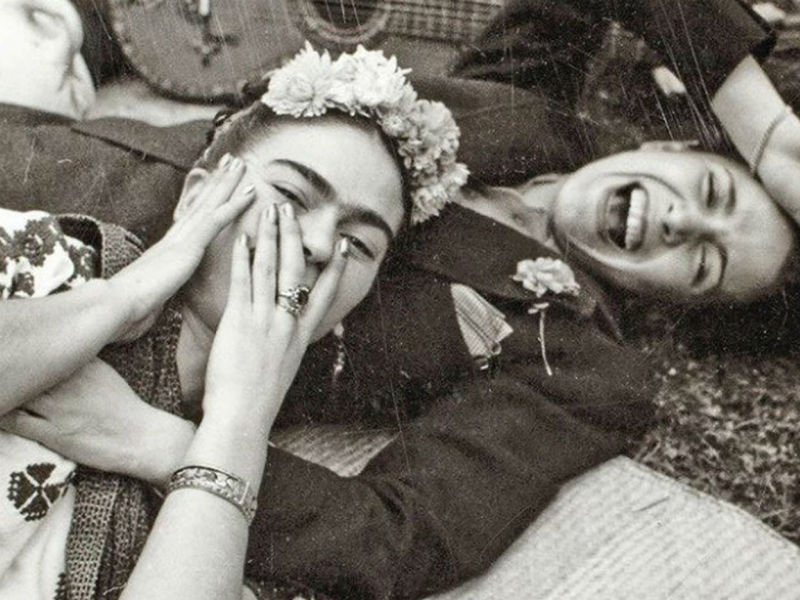
Modotti and Weston became a couple and moved to Mexico. There, through photography, which portrays a people in the midst of a revolutionary upheaval, they approach what would be their other great passion: politics.
Her love life united her with three successive communist leaders: Mexican Xavier Guerrero, who was Rivera’s assistant. They formed part of the revolutionary movement through the Mexican Union of Artists (UMA), made up of Diego himself, Manuel Álvarez Bravo, Charles Chaplin, David Alfaro Siqueiros, Frida Kahlo and others.
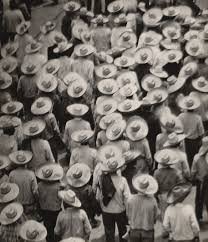
In 1928, she met Julio Antonio Mella, a member of the Cuban Communist Party, with whom she worked in the “Hands Off Nicaragua” committee, for the freedom of Antonio Gramsci, the Argentinean leader Rodolfo Ghioldi, and in the collection of signatures for the freedom of Nicolás Sacco and Bartolomeo Vanzzeti. Mella was murdered a year later and Modotti was expelled, accused of being an accomplice to the attempted assassination of Mexican President Pascual Ortiz Rubio.
Her third partner was the Italian Eneas Sormenti, with whom she became a member of the first Italian anti-fascist committee. They met in Mexico and met again in Moscow, where both were members of the Communist Party.

The Mexican writer Elena Poniatowska, in her biography of Modotti, entitled “Tinísima”, describes her as “a subject in search of a militant and documentary art, which tries to reconcile the aesthetic and political vanguard. A woman in search of identities through all kinds of instruments: the gaze, the word and the action”.
Tina died on 5 January 1942 of a heart attack while traveling in a taxi, although there is also the suspicion that she may have been murdered. On her tombstone in Mexico City’s cemetery is a verse dedicated to her by Pablo Neruda.
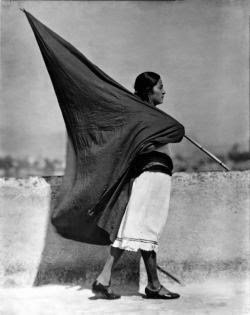
Assunta Adelaide Luigia Modotti, better known as Tina Modotti, at the age of 17 emigrated to the United States to catch up with her father and older sister, who already lived there. In 1921s she met Edward Weston and in 1922 she arrived in Mexico to bury her first husband Roubaix de L’Abrie Richey. In Mexico, she met and became close friends with Diego Rivera, David Alfaro Siqueiros, Blanca Luz Brum, Nahui Ollin, Maria Tereza Montoya and Frida Kahlo. she became a member of the Mexican Communist Party in 1927. She actively supported the struggle of Augusto Cesar Sandino and helped found the first Italian anti-fascist committee. In 1928 he met Julio Antonio Mella, a Cuban student leader, when the committee in support of the anarchists Sacco and Vanzetti was formed.

She was known for her controversial nude photos and for the particular look she reflected in the photographs she took of Mexico. She would later witness Mella’s murder. In 1930, she was falsely accused of conspiring to assassinate Pascual Ortiz Rubio, then president of Mexico, for which she was arrested. Thanks to Diego Rivera’s help, she was released but expelled from the country.
She arrived in Germany in the mid-1930s, traveled to the Soviet Union and met again with Vittorio Vidali, whom she had met in Mexico. She participated in the International Red Relief. In 1934 she left for Spain. During the Spanish Civil War, she enlisted in the Fifth Regiment and worked in the International Brigades, under the name of Maria until the end of the war. Margarita Nelken, in one of the several praises given to her activity, tells how she cared for the children who arrived in Almeria after the exodus from the town of Malaga which was harassed during the journey on foot by the bombing of the Franco forces.
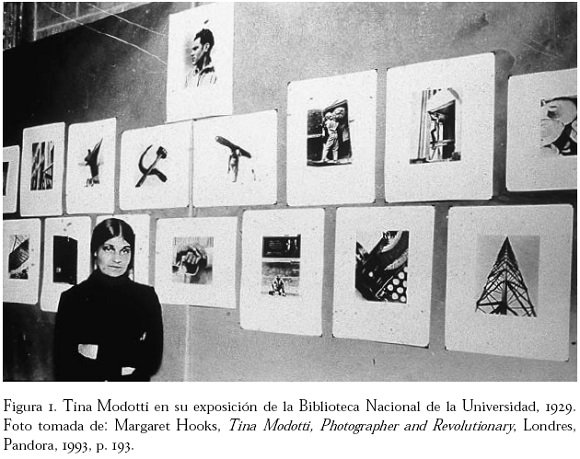 Figure 1. Tona Modotte at her exhibtion in the National University Library, 1929. Photo taken from Margaret Hooks, Tine Modotti, Photography and Revolutionary, London, Pandora, 1993)
Figure 1. Tona Modotte at her exhibtion in the National University Library, 1929. Photo taken from Margaret Hooks, Tine Modotti, Photography and Revolutionary, London, Pandora, 1993)
In 1939 she returned as an asylum seeker to Mexico, where she continued her political activity, through the Giuseppe Garibaldi Antifascist Alliance . In 1940, President Lazaro Cardenas canceed her expulsion. She died on January 5, 1942. In the book “Tina”, Pino Cacucci mentions a possible murder of Tina Modotti, which has always been a controversy since there was no autopsy.
Along with Weston, she was a mentor to Mexican photographer Manuel Alvarez Bravo. Mexican writer Elena Poniatowska wrote a biographical novel entitled “Tinísima”. Victor Hugo Rascon Banda wrote a play called “Tina Modotti”.
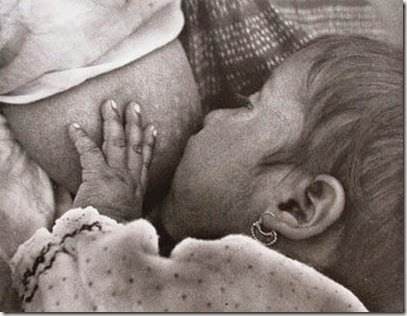 Modotti’s interest in her work was a reflection of her ideological commitment to the most vulnerable social groups. She worked as an editor and photographer for the magazine Mexican Folkways and the newspaper El Machete in 1924, and this work would lead her to be considered as a precursor of critical photojournalism in Mexico. Achieving an immediate identification with Mexico and its inhabitants that is reflected in her work.
Modotti’s interest in her work was a reflection of her ideological commitment to the most vulnerable social groups. She worked as an editor and photographer for the magazine Mexican Folkways and the newspaper El Machete in 1924, and this work would lead her to be considered as a precursor of critical photojournalism in Mexico. Achieving an immediate identification with Mexico and its inhabitants that is reflected in her work.
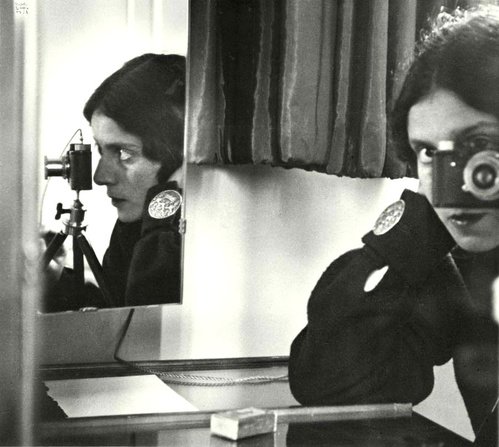
Her work was captured by artists such as Diego Rivera and José Clemente Orozco, who between the years 1927-1930 entrusted her with the task of photographing their works. This work represents]ed a certain historical value, which testifies to the realization of the works of these two Mexican muralists.
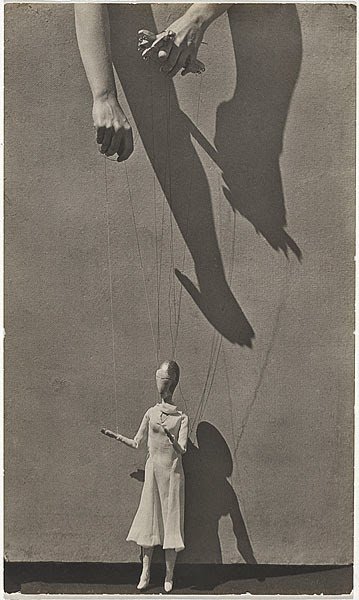 According to Manuel Álvarez Bravo, Tina Modotti had two periods: the romantic and the revolutionary. In the first, influenced by Weston, where she photographed flowers, objects and architectural details and the second emerged in Mexico, beginning her relationship with the Mexican muralist movement. She aimed to portray the work of these artists emphasizing details such as workers and indigenous people, in addition to her independent work, capturing images of indigenous and mestizo people and documenting the social struggle of the less privileged with great care in the composition and assembly of the scenes, but without poses or forced attitudes.
According to Manuel Álvarez Bravo, Tina Modotti had two periods: the romantic and the revolutionary. In the first, influenced by Weston, where she photographed flowers, objects and architectural details and the second emerged in Mexico, beginning her relationship with the Mexican muralist movement. She aimed to portray the work of these artists emphasizing details such as workers and indigenous people, in addition to her independent work, capturing images of indigenous and mestizo people and documenting the social struggle of the less privileged with great care in the composition and assembly of the scenes, but without poses or forced attitudes.
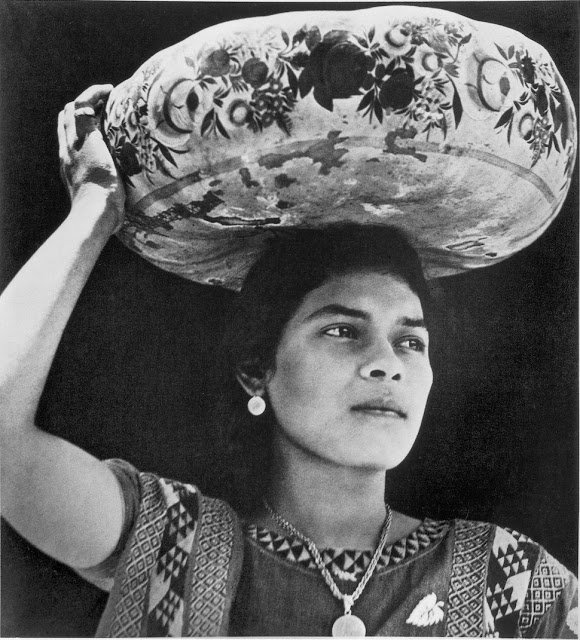 There is a period of transition in which she produced some of her most memorable photos, such as the hands of a farmer holding a shovel or the hands of a washerwoman.
There is a period of transition in which she produced some of her most memorable photos, such as the hands of a farmer holding a shovel or the hands of a washerwoman.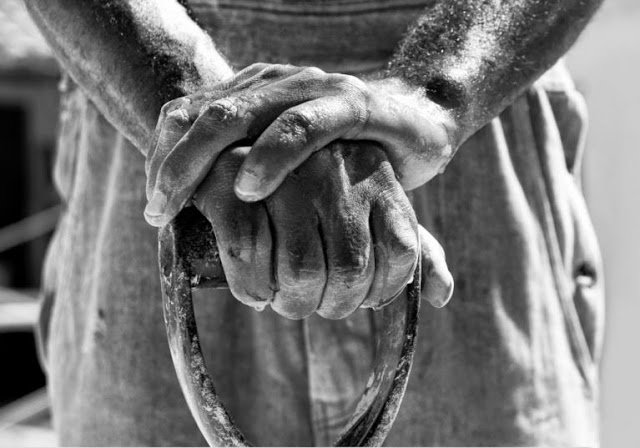
Women and Anti-Wrinkle Cream

Woman Falls into Coma After Using Anti-Wrinkle Cream
The affected person’s body contained abnormally high levels of methylmercury, a highly toxic element that can cause permanent damage to the nervous system
By Juventud Rebelde digital@juventudrebelde.cu
Published: Saturday 28 December 2019 | 09:25:37 am
Translated and edited by Walter Lippmann for CubaNews.

California Toxic Face Cream Alert Author: Twitter Posted: 28/12/2019 | 09:22 am
WASHINGTON, December 28.- A Sacramento woman was poisoned by a skin cream, leaving her in a coma. Hers was the first reported case of methylmercury poisoning in the United States, reports the Center for Disease Control and Prevention (CDC).
The 47-year-old woman visited a doctor in July of this year for a strange burning sensation and weakness in her arm. When she returned two weeks later with blurred vision and difficulty speaking, doctors admitted her to a University of California, San Francisco, hospital.
Then her condition quickly worsened into a delirious rage, as described by Dr. Paul Blanc of the California Division of Environmental Medicine and Poison Control System, CNN reports.
Her body contained abnormally high levels of methylmercury, he wrote. Methylmercury is highly toxic and can cause permanent damage to the nervous system, Blanc said. The CDC report indicates that her injuries are probably permanent.
The woman is now in a coma after using a mercury-contaminated face cream brought in from a Latin American country through an informal network. She used the toxic cream for years, the source said.
Her family explained to health officials that she used a skin-lightening cream, allegedly called Pond’s Rejuveness, twice a day for the past seven years. The woman acquired the cream through friends. The product is also used to remove blemishes and wrinkles.
Experts tested the cream and found that it contained 12,000 parts per million of methylmercury. The damage methylmercury inflicts on the nervous system often worsens after patients stop using or consuming contaminated products.
The condition of the patient, whose name was not published, continued to deteriorate even after she underwent chelation therapy, a treatment to remove mercury through the urine.
Rifles with Women’s Names

Rifles with Women’s Names
The women of Pinar del Río spoke about the role of Cuban women in the defense of their country during the parliamentary hearing on Women’s Voluntary Military Service, sponsored by the Committee on Defense and Internal Order of the National Assembly of People’s Power
By Zorileidys Pimentel Miranda
November 26, 2019
Translated and edited by Walter Lippmann for CubaNews..
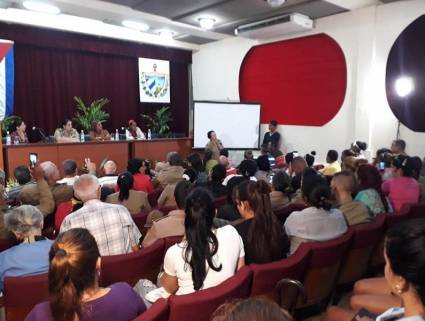
In the audience it was revealed that in the Women’s Voluntary Military Service duty and opportunity are combined for many young women Author: Zorileidys Pimentel Miranda Published: 26/11/2019 | 10:43 pm
PINAR DEL RÍO: The Women’s Voluntary Military Service (SMVF) is still a taboo in some Cuban families. Getting used to the boots, the olive green uniform, the backpack, the guards, the hikes, the days in the field, is very hard for women, according to many people.
However, there are families who are grateful that their daughters are living this experience. This was evident during the parliamentary hearing on the SMVF held on Tuesday in Pinar del Río, sponsored by the Committee on Defense and Internal Order of the National Assembly of People’s Power (ANPP).
The testimony of Odalys Orraca Castillo, mother of a young woman who was a member of the Border Brigade in Guantanamo, reached the audience. “It is always difficult to accept that a son is going to walk away. In our case, we already knew that our daughter was willing to comply with the SMVF and therefore there was an acceptance and we were all convinced that this was the best thing for her.
“The separation was difficult, but we remained calm because we always knew that they were well cared-for in every way. In the first two months after starting military service, my daughter told me: “Mom, don’t cry or worry anymore, because we are very happy; it is true that we have to work and do all the activities, but we also have fun, we have a good time, and above all, we learn a lot”.
Like this one, other stories came to the parliamentary hearing, which was attended by fighters of the Revolution, cadets, family members and representatives of various organizations and institutions from the territory.
Such was the case of Yusleidys Hernández Hernández, a member of the National Committee of the Young Communist League (UJC), who, for six months, learned what life is like in a military unit. “It was a unique experience for me. It contributed a lot to my training. Now I am more disciplined and consistent with the tasks of the Revolution. I feel great pride and satisfaction in being prepared to defend the country in any circumstance,” she said.
Then, she added that from the UJC, together with the Federation of Cuban Women, “We carried out exchanges in the educational centers, we showed videos about women who have lived this experience, we talked with the parents and we had concrete results.
For her part, Yilena Valdés Llano, a 19-year-old who finished her military service last August, said it was a 12-month apprenticeship. “I reached an incredible degree of maturity, it also taught me about military life, everything I need to know to defend the country. In addition, I was able to study and today I am in the first year of my degree in rehabilitation, something I am very passionate about.
Also participating in the hearing was Major General José Antonio Carrillo Gómez, president of the Defense Committee of the ANPP and of the Association of Combatants of the Cuban Revolution, who reiterated that at present, along with the economy, defense continues to be the great task of all Cubans to maintain our social system.
Emma Thompson: “I’m an Atheist”
El País [Spain] Emma Thompson: “I’m an Atheist Because Religion Oppresses Women
The acclaimed actress continues to fight for wage equality and transparency in the industry of which she is a part
By ROCÍO AYUSO
November 24, 2018
Translated and edited by Walter Lippmann for CubaNews.

Emma Thompson, during the premiere of ‘The Verdict’ last August GTRESONLINE
Emma Thompson is good at everything she does. She rose to fame as an actress, a passion that earned her an Oscar with Howards End (1992). She also has an Oscar as a writer, adapting Jane Austen’s Sense and Sensibility (1995) to the screen. And as an activist she never shuts up. She fights for equality and transparency in wages in the industry of which she is a part. Moreover, she personally takes on the causes she believes in, as demonstrated by the adoption of Tindyebwa Agaba, formerly a child soldier from Rwanda.
The proximity of the 60’s does not stop this Londoner, a declared atheist and Greenpeace advocate. She went in slippers to her appointment as a lady and whose last job, a Christmas advertisement to which she has given her voice, has been banned from Icelandic television. The spot tells the story of a little orangutan named Rang-tan who walks into a girl’s bedroom after escaping the destruction of the forest by palm oil traders. Thompson, married to fellow actor Greg Wise and mother of a daughter, Gaia, is now releasing The Verdict, a film based on the novel by Ian McEwan in which she plays a British High Court judge who has to make important decisions about her life and that of a child.
QUESTION. As much as you are judged as an actress, are you also judgmental?
ANSWER. Only when you sit in the place of the judges in a courtroom, up there, do you realize how easy it is to judge from that position. How easy it is to feel above everyone.
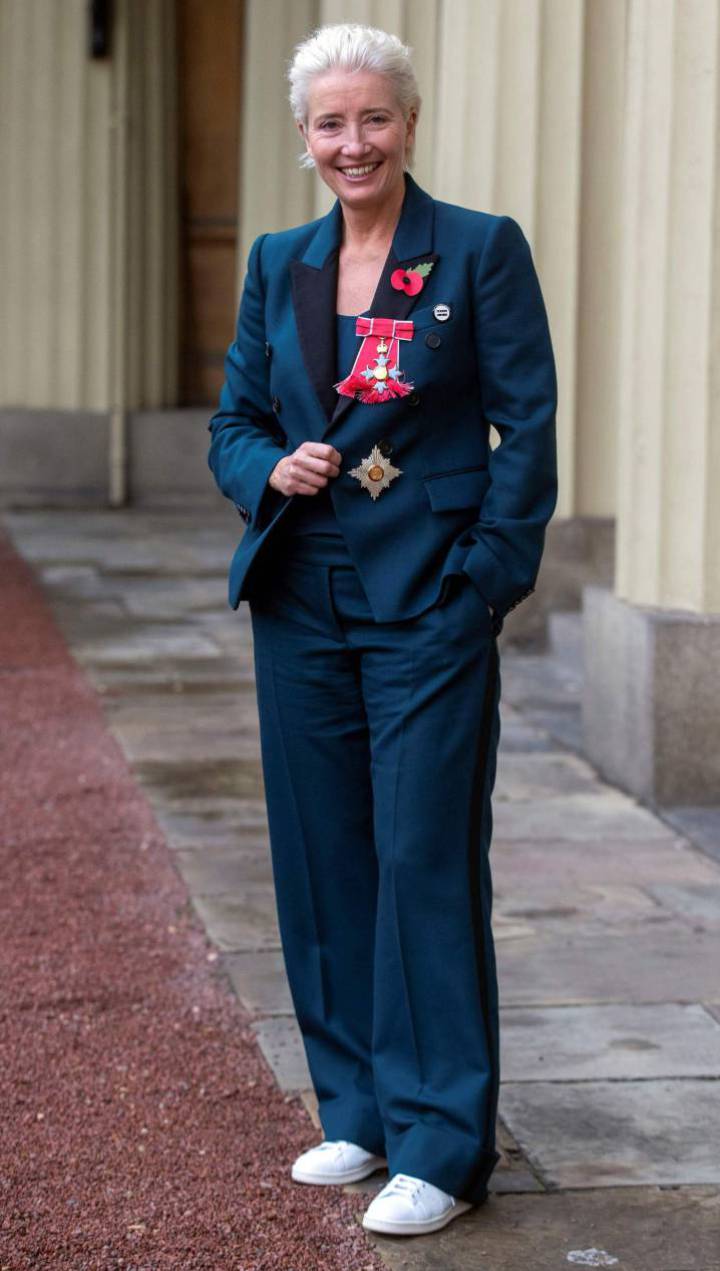
Emma Thompson, on her appointment as Lady of the British Empire, November 8. AFP
Q. And as a star, is it also easy to feel above everyone?
A. I guess it’s easy and I make those mistakes too. But my family takes care of taking me down a peg. When you enjoy a position like mine, it’s good to go shopping for milk once in a while. And I do. I’m sure I’m a bit of a brat or a spoiled brat sometimes. But at home I do the cooking, the shopping, and I’ve cleaned a few bathrooms. I try to keep my feet on the ground, but of course I’m very spoiled because I have a personal assistant without whom it would be impossible for me to do what I do.
Q. This year alone you have collaborated in a television series (Upstart Crow), in a television film (King Lear), you have done several voice works and you have two premieres, Johnny English Strikes Again and now The Verdict. What do you do when you have a couple of hours free?
A. I sleep (laughs). I’d say I go to the movies, but there are no movies that last two hours anymore. I’m not much of a TV watcher either even though I saw The Crown in one sitting. If I have two hours, I read. I like historical novels like Philippa Gregory’s or the work of that great feminist writer Rebecca Solnit.
Q Her defense of equality, of feminism, predates the #MeToo movement. Have things improved in any way?
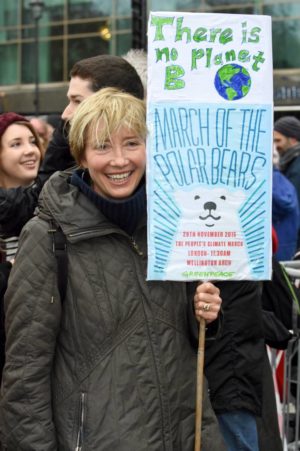
Emma Thompson, during the climate change march in London, UK, in 2015. G3ONLINE
A. They change and don’t change. Above all, I am a feminist who believes in women’s rights and equality. And it is impossible for me to feel sympathy or faith in any institution that systematically oppresses women. That is why I am an atheist. Because religion has a long history of oppressing women.
Q. One of your latest works has been an announcement for Greenpeace that has reignited the controversy. This is not your first collaboration with the environmental organization.
A. I have a very close relationship with Greenpeace. I have travelled with them twice to the Arctic and next year we will work together again. They are a very effective organization partly because of their political stance, because they don’t mind breaking the law and using civil disobedience if it brings attention to the problems that we are facing. We are as hooked on non-renewable energy as we are on tobacco. And the easiest and quickest solution to many of our problems is a boycott.
Q. The UK is going through a difficult time with the implementation of Brexit. How is it going in the final stretch?
A: The world must think we have lost our minds. The results plunged me into grief because I was born 14 years after the end of World War II. I still remember the feeling of loss in London, in a Europe traumatized by both wars. The idea of breaking up the union makes me sad. But you have to realize that many people are disenchanted with the system. Those who feel ignored by our government or by the union of European countries. So what is born now has to be a new union, a better one. I prefer to think that this is a good time for something new to be born. I take comfort in that thought.
Subscribe to Blog via Email
| M | T | W | T | F | S | S |
|---|---|---|---|---|---|---|
| 1 | ||||||
| 2 | 3 | 4 | 5 | 6 | 7 | 8 |
| 9 | 10 | 11 | 12 | 13 | 14 | 15 |
| 16 | 17 | 18 | 19 | 20 | 21 | 22 |
| 23 | 24 | 25 | 26 | 27 | 28 | |



You must be logged in to post a comment.